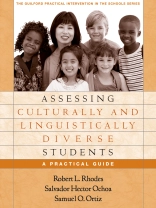This is the first book to present a practical, problem-solving approach and hands-on tools and techniques for assessing English language learners and culturally diverse students in K-12 settings. It meets a crucial need among practitioners and special educators working in today’s schools. Provided are research-based, step-by-step procedures for conducting effective interviews with students, parents, and teachers; making the best use of interpreters; addressing special issues in the prereferral process; and conducting accurate, unbiased assessments of academic achievement, intellectual functioning, language proficiency, and acculturation. Among the book’s special features are reproducible worksheets, questionnaires, and checklists–including several in both English and Spanish–in a ready-to-use, large-size format.
This book is in The Guilford Practical Intervention in the Schools Series, edited by T. Chris Riley-Tillman.
Table of Content
1. English-Language Learners in U.S. Public Schools: A Heterogeneous Population
2. Disproportionate Representation of Diverse Students in Special Education: Understanding the Complex Puzzle
3. Legal and Ethical Requirements for the Assessment of Culturally and Linguistically Diverse Students
4. Bilingual Education and Second-Language Acquisition: Implications for Assessment and School-Based Practice
5. Prereferral Considerations for Culturally and Linguistically Diverse Students
6. The Use of Interpreters in the Assessment Process and School-Based Practice
7. The Interview Process: Practical Guidelines
8. Acculturation Factors in Psychoeducational Assessment
9. Language Proficiency Assessment: The Foundations for Psychoeducational Assessment of Second-Language Learners
10. Conceptual Measurement and Methodological Issues in Cognitive Assessment of Culturally and Linguistically Diverse Individuals
11. Cognitive Assessment of Culturally and Linguistically Diverse Individuals: An Integrated Approach
12. Assessment of Academic Achievement: Practical Guidelines
About the author
Robert L. Rhodes, Ph D, NCSP, is Chair of the Department of Special Education/Communication Disorders at New Mexico State University, as well as a school psychology faculty member. He has experience working in public schools, child and adolescent psychiatric facilities, and an international school setting. Dr. Rhodes has served as President of the New Mexico Association of School Psychologists and state delegate to the National Association of School Psychologists, and is an associate editor of
School Psychology Quarterly. His research has focused on intervention strategies for culturally and linguistically diverse students and neuropsychological applications in the schools.
Salvador Hector Ochoa, Ph D, is Associate Professor of Educational Psychology at Texas A&M University, where he has a joint appointment in school psychology and special education. Dr. Ochoa serves on various editorial boards of school psychology and special education journals, and is an Associate Editor for the
American Educational Research Journal: Teaching, Learning and Human Development. He is a recipient of the Teaching Excellence Award from the Texas A&M Center for Teaching Excellence and the Distinguished Achievement for Teaching Award from the Association of Former Students. His research focuses on bilingual assessment, social status, and educational programming issues of Hispanic children.
Samuel O. Ortiz, Ph D, is Associate Professor of Psychology at St. John’s University in Queens, New York. Dr. Ortiz has served as a Visiting Professor and Research Fellow at Nagoya University, Japan, and is currently Vice President for Professional Affairs of American Psychological Association (APA) Division 16 (School Psychology). He was appointed to APA’s Committee on Psychological Testing and Assessment and has published widely on such topics as CHC Cross-Battery Assessment, intelligence testing, nondiscriminatory assessment, cultural and linguistic issues in psychology, and learning disabilities.












